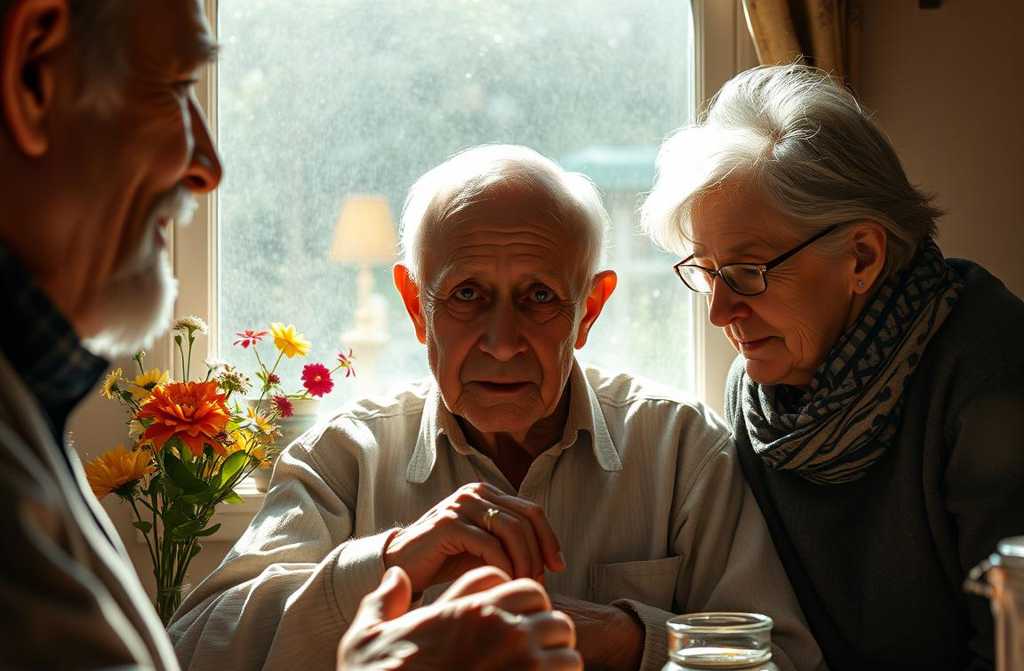Seven long years had passed since the day the earth swallowed Lydias body. Seven years of silence, ringing louder than any music in my ears, and loneliness that seeped into the walls of the house like the lingering scent of woodsmoke. Stepheneveryone called me Steviewas left alone at sixty-three. Not old, yet no longer young, as if stuck between two shores: behind me, a life once full of love and turbulence; ahead, only the quiet, joyless drift toward an inevitable end.
God hadnt cheated me of healthmy body, hardened by years of labour, still held strengthbut my soul was broken and hollow. Lydia had faded slowly, painfully. I cared for her till her last breath, till the final tear on her exhausted cheek. And then she was gone, leaving me alone in this wide world. The Lord hadnt blessed us with children, so we lived soul to soul in our own little universe, bound by the lanes of our village.
Id grown used to Lydia being the sun of my small planet. She was the warmth that heated our home, the light that filled it with comfort. Her hands cooked the richest stews, baked pies with pastry so light it melted on the tongue. She ran the householdthe dairy cow, the chickens, a calf fattened each year so wed have our own meat in winter. The garden was her kingdom, ruled by perfect rows of carrots, onions, and potatoes. My work was the ploughing, the digging, the mending of broken things. I was the outer wall of our fortress; she was its heart.
A man gets used to anything. I got used to the silence. At first, it pressed down, ringing in my ears, making me flinch at every creak of the floorboards. Then it became background noise. Dull? Yes. Unbearably empty? Absolutely. But what could I do? Thats fates wayyou cant fight it.
The village women, of course, took notice. Steviea decent-looking man, a hard worker, a house in good order, and no children to complicate thingswas near enough a winning lottery ticket in these parts. Matchmakers came whispering, some bold enough to suggest “starting a family.” But I brushed them off like bothersome flies.
“Im still mourning my Lydia,” Id explain, staring past their heads into the emptiness. “Shes watching from up there. Wouldnt approve of me bringing another woman into her home. Wouldnt want her memory overshadowed.”
Truth be told, in the quiet of my thoughts, it was different: “To live together, thered need to be a spark. A drop of feeling. And there isnt any. My soul hasnt thawed yet.”
After Lydias death, I sold the cowwhat use was all that milk to a man alone? A fine Jersey she was, giving a bucket morning and evening. Sold her to a neighbour, sick with guilt, as if Id betrayed another living thing tied to Lydia. But I kept raising a calf each summerfor meat. Thats how I lived: my own meat, my own eggs, milk borrowed or bought from Edith next door, who watched me with silent pity.
I walked with a limp. Long ago, in my youth, a stubborn horse broke my leg. The bone set crooked, but Id waved it offno time for fuss. The limp became part of me, and in recent years, a cane appearedoak, carved, a gift from Lydia. No one remarked on my uneven gait anymore, as if it had always been so.
That day, I sat at the kitchen table, alone, ladling out a bowl of freshly made stew. Summer heat hung thick, the air shimmering over the fields. The back door stood wide open, letting in sluggish waves of scorching air. Suddenly, a shadow crossed the rectangle of sunlight on the floor.
“Afternoon, Stevie! Mind if I join you? Door was openhope you dont mind me barging in!” Toms voice, loud as a church bell, rolled through the kitchen. Tom was decades younger, brimming with energy and schemes I couldnt fathom.
“Afternoon,” I grunted. “Fancy some stew? Just off the stove. Chop some spring onions inwont regret it. Keep me company.”
“Dont mind if I do! Love your stew. Hot as it is, nothing beats a proper meal. Well cool off after!”
Between mouthfuls, Tom eyed me like a hawk.
“Listen, Stevie, you ought to remarry. No life for a man, stuck by the stove alone. A woman could cook for you, warm your bed, and well, you know.”
“Turning matchmaker now?” I smirked. “Found me a bride, have you?”
“Why not? How longs it been? Youre a catchcould have your pick of the local beauties!”
“A womans more than just a body,” I said quietly but firmly. “Got to be soul to soul. Understand each other without words. One look, and you just know.”
“Oh, soul!” Tom waved a hand. “Youre past seventy! Who cares about souls at your age? Just someone to look after you, fetch your tea when youre poorly. Think ahead!”
“Ahead?” I set my spoon down and met his gaze. “You reckon Im some doddering old fool, ready to shack up with the first willing lass? No, Tom. Ive still got a choice. And Ill live as I please.”
“Didnt mean it like that! No offence,” Tom backpedaled. “Just looking out for you! Thats why I brought it up. Got an aunt, Agatha. Lives over in Millfield. Firecracker of a womannot old, sharp as a tack. Keeps pigs, geese, a calf. Handsome, too. Names Agatha! Visited her last week. Lively, full of life, and lonely. Fancy a trip? Meet her. Like herjob done. Bring her back here.”
I snorted. “Whats in a name? Its living under the same roof, running a home. These modern women love themselves more than work. Would she muck in with the garden, the livestock? They want pampering these days. And Im no knight in shining armour. Too old for courting, anyway.”
“Rubbish! Ill come with you. Shes familywed be proper kin then! You know me, I know you. Wed get on grand!”
Talk dragged on till evening. Wearied by his persistence and a flicker of curiosity, I gave in. We agreed to go in two days, Saturday, in Toms battered old Rover.
When he left, silence swallowed the house again. The idea of remarriage, once abstract, now had flesh and bone. I looked around, seeing it fresh: dust on the sills, cluttered with junkjars, nails, dried leaves Lydia once collected. The floor, long unscrubbed. A mountain of dishes in the sink.
Next morning, I rose at dawn, driven by some inner whip. I dusted the sills, ruthlessly tossed the clutter. Scrubbed the floor till it gleamed, the smell of freshness oddly lifting my spirits. Then the dishes. Found an old bottle of soap, squeezed out thick, lemon-scented foam.
“Blimey,” I thought, watching plates shine under the tap. “Moods better already. Might as well do the mugs. Havent tidied like this in years.”
Saturday morning, Tom honked outside. I wore my only suit, still decent, though it smelled of mothballs and the past. The road was long and potholed. We arrived by midday.
Toms car stopped by a leaning but sturdy fence. A woman stepped outpleasant-looking, early fifties, making her a good decade younger than me. Her smile was broad, too rehearsed.
“Finally! Ive been waitingdinners going cold! What kept you?” she called before reaching us.
Her tone, her familiarity, sent a chill through me. It was clearId been “arranged” without my knowing. My hand twitched toward the door handle, ready to order Tom to turn back. Then I heard her whisper:
“Hes a cripple?” Her eyes flicked to my cane.
“Hardly, Aunt Agatha,” Tom said quickly. “Broke his leg years agojust a limp. Nothing to it.”
She stepped closer, offering a hand. Her palm was unexpectedly soft, as if untouched by work.
“Welcome, dear. Im Agatha,” she said warmly.
I shook her fingers awkwardly. “Afternoon. Stephen. Or Stevie, if you like.”
A glance at her yard showed neat rows, a freshly whitewashed shed, not a weed in sight. “Hard worker,” I thought. “Proper homemaker.”
Inside, the table groaned under dishes: braised pork, pickles, stacks of golden pancakes beside a pot of cream, cured bacon, spring onions, and, crowning it all, meat pies that filled the air with richness. “Generous,” I noted. “Pulled out all the stops.” Tom winked: “Told you so







